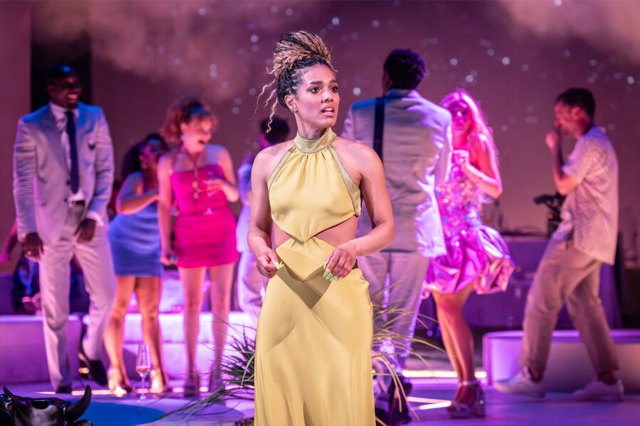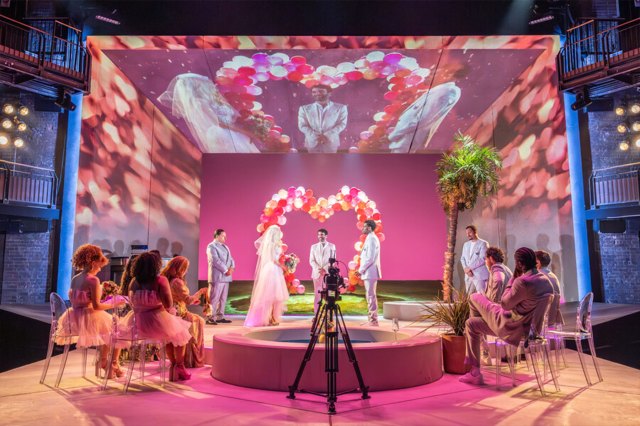Much Ado About Nothing at the RSC’s Royal Shakespeare Theatre – review
Freema Agyeman and Nick Blood star in the football-infused revival, running until 24 May

Director Michael Longhurst, taking on this oft-performed stalwart of the Shakespearean comedy canon, readily admits the biggest questions faced by those staging productions in 2025 are: why this play, and why now? His solution is to mine it for its currently resonant themes – in Much Ado’s case, the flimsy nature of reputation and the dangers of unfounded social opprobrium – and throw all the resources you’ve got at them.
This means the hippest of hip singer-songwriters SuRie penning a handful of tunes, a concept moulded around the behind-the-scenes machinations of a European Cup-winning football team (Messina FC), and a laddish culture providing the backdrop to the narrative of a girl wronged by malicious slander and the love-wrangling of the romantic leads Beatrice and Benedick.
But before the purists start reaching for the smelling salts – or possibly even a defibrillator – the superficiality of this world, and the spectacle with which Longhurst and his designer Jon Bausor deliver it, are really only skin-deep, and there’s a real sense that there’s something richer and more interesting going on beneath the surface.
In truth, once you get past the opening scenes with their in-yer-face transposition of Leonato’s court to the players’ tunnel and locker room of a major football club – complete with vapid chanting, post-match interviews and communal baths – this production reverts to something rather more ‘straight’, dare one even say conventional.
So yes, Beatrice is set up as an edgy female sports presenter, Benedick as one of the star players, Leonato as the club’s owner and Don Pedro as the manager. The conceit actually stands up pretty well, if you’re willing to concede some language substitutions and a large dollop of poetic licence. But an hour in, Nick Blood’s Benedick has largely dropped his estuary accent, Freema Agyeman’s earpiece and microphone have long since vanished and there’s barely a football shirt in sight. A game of two halves, in fact.
The leads are generally pretty good, although some lines are lost in a rushed delivery, and there’s strong support from Daniel Adeosun as outraged would-be husband Claudio, Eleanor Worthington-Cox as the wronged victim Hero and Olivier Huband’s measured and thoughtful Don Pedro. Elsewhere, performances prove more patchy, and the tedious subplot involving an inept team of security guards is as irritating as ever.

The ensemble are not helped either by the design, which places a circular pool centre-stage to double as the players’ bath and a fountain at the owner’s villa, forcing most of the crucial action too far upstage, often partially hidden behind a TV camera or some furniture, and creating a distance between performers and audience that makes it hard for them to come across as anything other than shallow, vacuous and unlikeable.
But it’s a lively and fresh take on the play, which offers plenty to appeal to modern viewers without causing the old guard too much offence. Just don’t let the football concept put you off – once you get past the initial shock value, the Bard is still clearly visible behind the pizzazz.
















